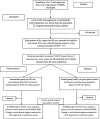Assist-linked brief intervention to reduce risky pattern of substance use in male workers employed at a tertiary care hospital in India: A randomized controlled trial
- PMID: 36874527
- PMCID: PMC9983456
- DOI: 10.4103/indianjpsychiatry.indianjpsychiatry_660_21
Assist-linked brief intervention to reduce risky pattern of substance use in male workers employed at a tertiary care hospital in India: A randomized controlled trial
Abstract
Background: Substance use in workplace leads to adverse effects both on the employees and on the workplace. Existing research focuses on alcohol-related harm, while workplace use of other substances has been neglected. There are no randomized controlled studies of brief interventions in Indian hospital settings.
Aim: To evaluate the efficacy of World Health Organization (WHO) alcohol, smoking, and substance involvement screening test (ASSIST)-linked brief intervention (ALBI) for reducing risky patterns of substance use in male workers at a tertiary-care hospital in North India.
Material and methods: The study was conducted in two phases. In Phase-I, a random list of 400 employees was generated from the entire pool of male hospital workers, of which 360 participated. Data on the ASSIST risk categories (mild, moderate, and high) were generated from Phase I. In Phase-II, moderate- or high-risk subjects ('ASSIST screen-positive') were randomized into intervention and control groups, with 35 screen-positive subjects in each group. The intervention group was provided a 15-30-min structured session per ALBI protocol, while the control group was given a 15-30-min general talk on health-related consequences associated with substance use. The subjects were compared on ASSIST score, WHO quality-of-life brief version (WHOQOL-BREF) and readiness to change questionnaire (RCQ) at baseline and at 3-month follow up.
Results: The prevalence of moderate-to-high-risk use of tobacco, alcohol, and cannabis in the total sample was 28.6%, 27.5%, and 6.9%, respectively. At 3-months postintervention follow-up of the randomized sample, recipients of ALBI had significant reduction of ASSIST scores for all substances compared to the control group (p < 0.001). More participants receiving ALBI were ready to change to RCQ action stage (p values for tobacco, alcohol, and cannabis <0.001, <0.001 and 0.007, respectively). WHOQOL-BREF scores significantly improved in ALBI group across all domains.
Conclusion: ALBI was effective in reducing risky substance use, increasing readiness to change and improving the QOL of the subjects at workplace setting.
Keywords: ASSIST; brief intervention; hospital employees; male worker; psychoactive substances; randomized controlled trial; screening.
Copyright: © 2023 Indian Journal of Psychiatry.
Conflict of interest statement
There are no conflicts of interest.
Figures
References
-
- Murthy P. Partnerships for Drug Demand Reduction in India: Developing Community Drug Rehabilitation and Workplace Prevention Programmes. United Nations Drug Control Programme, Ministry of Social Justice and Empowerment, Government of India, International Labour Organization, European Commission. 2002. [Last accessed on 2022 Dec 14]. Available from: https://www. unodc.org/pdf/india/Partnerships%20808%20Report.pdf .
-
- Humeniuk RE, Dennington V, Ali RL. Geneva: World Health Organization; 2008. The Effectiveness of a Brief Intervention for Illicit Drugs Linked to the ASSIST Screening Test in Primary Health Care settings: A Technical Report of Phase III Findings of the WHO ASSIST Randomised Controlled Trial.
-
- Miller WR, Rollnick S. 2nd ed. New York: The Guilford Press; 2002. Motivational Interviewing:Preparing People for Change.
-
- Prochaska JA, DiClemente CC. Transtheoretical therapy:Towards a more integrative model of change. Psychotherapy. 1982;19:276–88.
LinkOut - more resources
Full Text Sources




